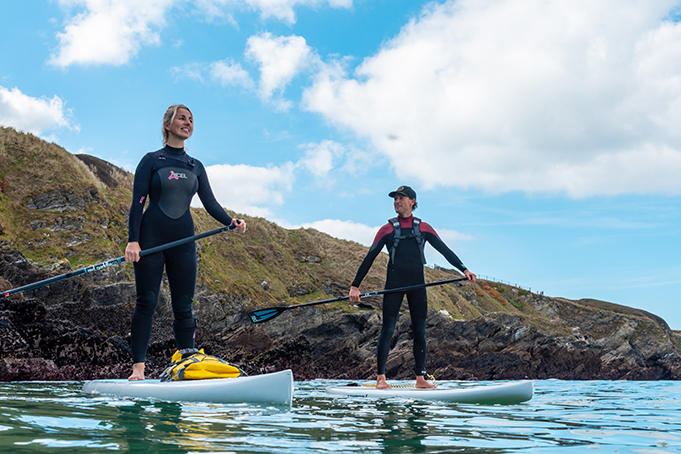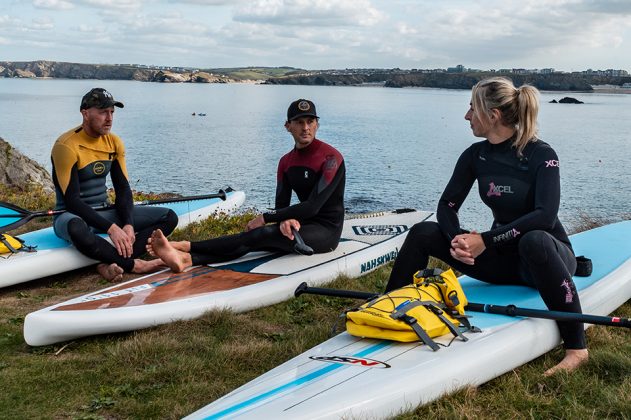PADDLE SCIENCE #13 –
COLD EXPOSURE
Words – Kate Starling
Why are we so afraid of being cold? As creatures of habit we’ll always seek comfort over discomfort, a couple of pillows over none, hot tea rather than tepid coffee and a windproof jacket over a t-shirt. With internal heating, thermostats, Primaloft jackets, merino wool base layers and knitted hats and scarves to keep us warm, it’s hard to actually be cold these days. When you think of the guys who used to climb Everest, right back at the beginning, they wore nothing other than wool jumpers and basic coats. They had none of the technical clothing and gear we have today yet still faced extreme freezing conditions well into the sub-zeros.
Whilst a SUP session in the winter isn’t exactly like climbing Everest, immersing yourself in a cold ocean at this time of year becomes a lot more challenging. Generally, this challenge is far more psychological than it is physical. In the UK, the sea temperature doesn’t drop that dramatically but as the air temperature plummets during a cold snap it’s easy to be forgiven if you’d rather stay in your nice warm car and stare at the ocean rather than getting in. Notably, living the comfortable lives that we do, we rarely face any physiological stressors throughout the course of a day. However, jumping into a cold sea in January will push you out of your comfort zone. And that really isn’t such a bad thing. If you’re in need of convincing and need some motivation to SUP throughout the winter, then consider the benefits of cold water SUP. If you’re keen and motivated enough to get in the sea, remember a warm shower, a hot cup of tea and some dry clothes will always be waiting for you once you’ve finished.

IT CAN IMPROVE YOUR IMMUNE SYSTEM
Throughout the body, our lymphatic system consists of a network of lymph vessels. These vessels transport lymph fluid which removes any waste products, bacteria and microbes from the body. When we expose ourselves to cold water, it stimulates the lymphatic system, encouraging increased lymph fluid circulation. As a result, this prompts our white blood cells to attack and destroy any bacteria within the blood, boosting our immune system response. Cold water has been shown to reduce infection frequency and increases the number of lymphocytes within the body. Immersing yourself in the cold can therefore help your body to fight and stave off infection over the winter months.
IT IMPROVES YOUR CIRCULATION
Having good cardiovascular circulation is critical to our overall health. Cold water immersion causes vasoconstriction of the blood vessels close to the skin, sending increased blood flow to our vital organs. This increases the volume of blood to the heart, requiring your heart to pump more efficiently to supply the rest of your body with oxygen and nutrients. In this way, cold exposure can boost the circulation, helping to increase your metabolic rate and your immune response.
IT REDUCES INFLAMMATION
If you’ve ever done any high intensity exercise then it’s likely that you’ve experienced delayed onset muscle soreness (DOMS) or exercise induced muscle damage (EIMD). If you exercise at a higher intensity than normal tiny microscopic tears occur within the muscle fibres, which can lead to tissue inflammation. This is why you often feel muscle soreness in the days following a heavy exercise session. Research shows that immersing yourself in cold water can help to prevent DOMS and EIMD and its associated inflammatory change, boosting physical recovery at 24, 48, 72 and 96 hours post exercise. It also helps to reduce muscle fatigue. Cold water causes vasoconstriction which helps to reduce swelling and inflammation. It can also have an analgesic effect to help relieve muscle soreness.
“Due to the high density of cold receptors in the skin, cold water sends an overwhelming amount of electrical impulses from peripheral nerve endings to the brain. Research has shown that this can be extremely effective in boosting mood and reducing depression.”
IT BOOSTS YOUR MOOD
Exposure to cold is known to activate the sympathetic nervous system and increases the levels of beta-endorphin and noradrenaline within the blood. It also increases the synaptic release of noradrenaline in the brain. Due to the high density of cold receptors in the skin, cold water sends an overwhelming amount of electrical impulses from peripheral nerve endings to the brain. Research has shown that this can be extremely effective in boosting mood and reducing depression as the brain releases increased levels of dopamine and serotonin. If you’re feeling the winter blues then a cold water SUP session may just be the answer to making you feel happier.
IT MAKES YOU TOUGHER MENTALLY
Being cold is uncomfortable. I mean it really isn’t much fun. This is precisely why we try to keep away from it. It’s understandable that if you’ve just scraped the ice off your windscreen and your breath is condensing on the car window on the way to the beach then the prospect of taking your clothes off and putting a wetsuit on isn’t that great. However, forcing yourself to get changed and get in the sea on a cold, icy wintery day will definitely increase your mental fortitude and resilience. The worst thing which will happen during your SUP session is that you get a bit cold. You can always warm up afterwards.

ARE YOU KEEN TO GET COLD?
Outside of a SUP environment, you can train your body in cold exposure sessions which will help enormously with your mental attitude and the level of physiological stress you’ll face in and on the water. If you’re used to having a hot shower every day, start to reduce the temperature of your shower. To start with, reduce the water temperature until it’s still vaguely warm but just about bearable for about 2-3 minutes. Then gradually reduce the temperature until the water’s completely cold and try to stay under it for about 5 minutes. Reducing the temperature gradually will help to minimise the shock and abject horror of it all and will allow your body to gradually adapt. Aim to have a cold shower once or twice a day over the course of several weeks or months. This method of daily, brief cold water stress allows your body to adapt in order to withstand and tolerate the cold much better. The aim of SUP in the winter isn’t to expose your-self to such extremes that it poses at best, an intense level of misery or at worst, dangerous levels of frostbite or hypothermia. However, getting out of your comfort zone challenges you to explore your physical and mental potential and will enable you to embrace SUP over the winter months. These days we have great suits on the market and a multitude of boots, gloves and rash vests to choose from to keep you warm. There are really no excuses not to get in. Cold water SUP has the ability to invigorate and refresh you and your heated lounge will be waiting for you after. Enjoy your winter paddling. SUP INTERNATIONAL
Kate is a physiotherapist and standup paddler. Reach her at www.newquayphysio.co.uk


